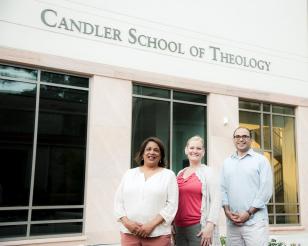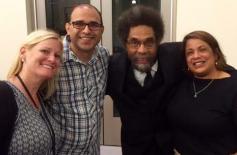In mid-June, I arrived at Emory University, the host site for the 2015 session of the Hispanic Summer Program, to spend two weeks in a course on Liturgy in the Hispanic ministry context. The Hispanic Summer Program is an annual summer academic session and intentional community that brings together Hispanic faculty and a student body that is primarily (but not exclusively) Hispanic.
The program is sponsored by Yale Divinity School, along with more than 40 other university departments of theology, seminaries, and divinity and theological schools from many Christian traditions. Sponsor institutions offer the Hispanic Summer Program courses to their students as an opportunity to enrich theological and ministerial education with the experience of living, worshiping, and studying within a Hispanic context.
Lo Cotidiano
At the opening Convocation in Cannon Chapel at the Candler School of Theology on the Emory campus, each student brought to the altar something that has meaning in his or her community. I brought a colorful Mexican ceramic image of the sun from my home in California, to represent creation care and the warmth of acceptance. I placed it on the altar amid other items from the community: family photos, an icon of La Virgen de Guadalpe, and a worn pair of huarache sandals.
Claudio Carvalhaes, an ordained teaching elder in the Presbyterian Church in the USA and Associate Professor of Liturgy at McCormick Theological Seminary, served as liturgist for the 2015 program. He explained that what we bring to the altar from our communities is recognized as holy. To Hispanic people living under dominating social structures, lo cotidiano, everyday life experience, is the place where the pain of rejection meets the triumph of salvation.
Liturgy and worship
I enrolled in the course titled “Liturgy and Preaching from Postcolonial Lenses” and served as a chapel minister with three other students on a team that was supervised by our professor, Carvalhaes. In our academic work, we explored not only the spread of Christianity from the early church to the Americas, but also the cultural and political legacy, the human consequences, of the connection between Christianity and empire. We read the works of mujerista and decolonialist theologians including Ada María Isasi-Díaz, Eduardo Mendieta, Walter Mignolo, and Fernando Segovia. Our class was conducted in English, but in discussions and planning sessions, we often went back and forth between English and Spanish.
The theology we discussed in class was put into practice in the planning of the daily culto (worship service). Members of the community suggested themes, then worked with chapel ministers to develop an order of worship. After the academic portion of each class session, we raced to Cannon Chapel to set up the overhead screens with translations and song lyrics, to arrange seating and sound equipment, and to drape the altar. I also worked with volunteer musicians from the community, learning and rehearsing songs in the evenings.
Academics and community
Dax Crocker, a second-year M.Div. candidate at YDS, also participated in the 2015 Hispanic Summer Program. He believes it is “critical for Latina/Latino theology students, and anyone interested in participating in ministry with and among the growing numbers of Hispanic Christians.” Dax is a native of Guatemala and a pastor in the Pentecostal tradition. He found the experience of Hispanic community particularly meaningful. “I felt at home. We were able to share in the cultural language of acceptance. I was among people who knew the lyrics to not only the worship songs that are moving to me, but also to the contemporary dance songs that make me move. I enjoyed authentic conversation with a variety of people, both in and outside the classroom, who have felt the same hurts of racism.”
Gilda Hernandez is a third-year M.Div. candidate at YDS discerning a ministry calling in the American Baptist Church, who also went through the program this summer. She describes a cultural liberation of her academic pursuits. “The Hispanic Summer Program offered me another perspective on theology and its practical applications beyond my experience at YDS. In my course, I was able to weave together Pope Francis’ encyclical statement on the environment, the effect of climate change on the world’s poor, and my research on the ongoing ecological degradation of the South Bronx, into a presentation.” Gilda completed the course titled “Social Ethics and Contemporary Movements for Justice,” instructed by Teresa Delgado of Iona College, and commented that she was impressed by Delgado’s scholarship, “as well as a personal commitment to social justice that she modeled for us.”
The Hispanic Summer Program experience includes the ministry of its faculty, who share meals and conversation with students. According to Dax, the chance to “engage in discussions with Hispanic and Latino professors like Dr. Leticia Guardiola-Sáenz from Seattle Pacific University was meaningful for me.” Dax completed the course titled “Race and Pentecostalism in the Borderlands,” instructed by Rudy Busto of the University of California, Santa Barbara.
 Visitors see “through Hispanic eyes”
Visitors see “through Hispanic eyes”
Concurrent with the Hispanic Summer Program, non-Hispanic faculty and representatives from sponsoring institutions attended “Through Hispanic Eyes,” which allowed them the opportunity to meet, exchange ideas, and attend classes. Vernice “Hopie” Randall, Associate Dean of Admissions and Financial Aid at YDS, participated in this program, and offered encouragement and support to Gilda, Dax, and me, sharing meals with us and sitting in on Dax’s class. Randall also joined us at a lecture (hosted by the Hispanic Summer Program but open to the Atlanta public) by Cornel West, a colleague of Daisy Machado, the program Director, at Union Theological Seminary. West spoke about “Black/Brown Reflections on Race, Theology, and Church,” stressing unity through shared values that embrace diversity in order to stand up against racism.
The borderlands
The Hispanic Summer Program offers the experience of community in which racial, cultural, and religious permeability abuts and challenges structures of hierarchy, privilege, and segregation. Students share in the reality of living with more than one cultural identity, more than one story; they experience traversing and bridging languages and cultures in daily life at the borderlands, la frontera. For Latino and Hispanic communities, the borderlands is a transformative place of hope where outside meets inside. The Hispanic Summer Program celebrates a Christian context that is alive, hopeful, and growing beyond the borderlands.
Pamela Stevens ‘17 M.Div. is originally from Los Angeles, but now calls Sacramento home. She is a second-year M.Div. candidate at Yale Divinity School and is pursuing an Anglican Studies certificate at Berkeley Divinity School, in discernment for ordained ministry.